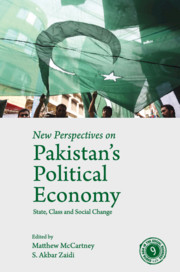Book contents
- Frontmatter
- Contents
- Preface
- Introduction
- 1 In a Desperate State: The Social Sciences and the Overdeveloped State in Pakistan, 1950 to 1983
- 2 The Overdeveloped Alavian Legacy
- 3 Institutions Matter: The State, the Military and Social Class
- 4 Class Is Dead but Faith Never Dies: Women, Islam and Pakistan
- 5 The Amnesia of Genesis
- 6 The Political Economy of Uneven State-Spatiality in Pakistan: The Interplay of Space, Class and Institutions
- 7 An Evolving Class Structure? Pakistan's Ruling Classes and the Implications for Pakistan's Political Economy
- 8 The Segmented ‘Rural Elite’: Agrarian Transformation and Rural Politics in Pakistani Punjab
- 9 Ascending the Power Structure: Bazaar Traders in Urban Punjab
- 10 Democracy and Patronage in Pakistan
- 11 From Overdeveloped State to Praetorian Pakistan: Tracing the Media's Transformations
- About the Contributors
- Index
Preface
Published online by Cambridge University Press: 26 April 2019
- Frontmatter
- Contents
- Preface
- Introduction
- 1 In a Desperate State: The Social Sciences and the Overdeveloped State in Pakistan, 1950 to 1983
- 2 The Overdeveloped Alavian Legacy
- 3 Institutions Matter: The State, the Military and Social Class
- 4 Class Is Dead but Faith Never Dies: Women, Islam and Pakistan
- 5 The Amnesia of Genesis
- 6 The Political Economy of Uneven State-Spatiality in Pakistan: The Interplay of Space, Class and Institutions
- 7 An Evolving Class Structure? Pakistan's Ruling Classes and the Implications for Pakistan's Political Economy
- 8 The Segmented ‘Rural Elite’: Agrarian Transformation and Rural Politics in Pakistani Punjab
- 9 Ascending the Power Structure: Bazaar Traders in Urban Punjab
- 10 Democracy and Patronage in Pakistan
- 11 From Overdeveloped State to Praetorian Pakistan: Tracing the Media's Transformations
- About the Contributors
- Index
Summary
The genesis of this book lies in teaching a course on the economic development of South Asia, at both Oxford University and the School of Oriental and African Studies (SOAS) at the University of London, and in trying to assess and explore ideas about the political economy of regions and states other than those of India. Unlike the rich academic literature on studying India and other countries of the Global South across a variety of schools of thought in economics, politics and political economy, the limited focus on Pakistan has largely been dominated by a single framework, one proposed by Hamza Alavi, which focused on the notion of an overdeveloped state, with regard to Pakistan and, later, Bangladesh, in a paper published in the New Left Review in 1972. One option for teaching such a course was to use the comparative nature of scholarship, primarily one based on the Indian academic and social science tradition and historical context, and consider its relevance for Pakistan. However, as academics, researchers and scholars of India, or the other countries which constitute South Asia realise, that while this is how much of the academic teaching and research in and on South Asia usually functions, it is a very suboptimal choice of teaching and scholarship, given the specificities of the different countries. Pakistan, like the other South Asian countries, differs substantially from India, given its political economy and history, and requires an examination based on its own terms and in its own context. While exceptional scholarship of social scientists from India and those who work on India is now increasingly providing theoretical and empirical evidence redefining numerous theoretical paradigms – as we find in this volume as well – what has been lacking for at least four decades now is rigorous assessment of Pakistan's political economy, which, until recently, has continued to be dominated by the work and influence of Hamza Alavi.
In February 2016, Professor Matthew McCartney and his student Muhammad Ali Jan organised a workshop in Oxford sponsored by Wolfson College and the Contemporary South Asian Studies Programme (CSASP) to address this problem and to assess the state of scholarship in the social sciences and of the political economy of Pakistan, almost four-and-a-half decades after Alavi's thesis.
- Type
- Chapter
- Information
- New Perspectives on Pakistan's Political EconomyState, Class and Social Change, pp. ix - xPublisher: Cambridge University PressPrint publication year: 2019

